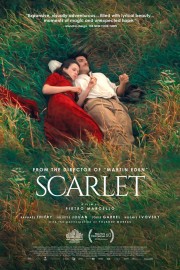Scarlet
“Scarlet” is a film that would resonate with anyone who has a memory of a parent who tried as hard as they could to give you the life you deserved. They might struggle in doing so, or even fail, but they’ll never stop wanting what’s best for you. It’s interesting that the film I saw prior to this one is Pixar’s “Elemental,” which hits on a similar idea, but in a different way. Pietro Marcello’s previous film, “Martin Eden,” didn’t really connect with me, but “Scarlet” did, and it does so because of the heart infused in Raphaël (Raphaël Thiéry), the father home from WWI, and Juliette (Juliette Jouan), his daughter, whom was born after he went off to war.
In Marcello’s adaptation of Alexander Grin’s novel, there are two technical aspects that are important to this film’s success- the cinematography by
Marco Graziaplena, and the music by Gabriel Yared. Shot in old Academy framing, the cinematography by Graziaplena catches our attention immediately as we see soldiers make their way home, before focusing on Raphaël. The color is very grainy and feels from another age. He returns to find Madame Adeline (Noémie Lvovsky) in possession of Juliette- presumably, his wife did not survive the birth. She can put him up and give him a place to stay and raise Juliette while trying to provide for them- he is a woodworker- but as the years go on, it’s harder for him to maintain a living for them. As Juliette grows up, she is isolated and odd, and holds hope she gains from an old woman who tells her that scarlet sails will take her away from her village.
Music is one of the ways Juliette expresses herself. The songs she sings are beautiful, and accentuated by a lush and lovely score by Yared, who has always have a talent for romantic themes and ideas. Some of “Scarlet’s” most memorable scenes are of Juliette, alone, singing, or even contemplating. Jouan’s performance is a wonderful one, and provides a warmth that is in contrast to Thiéry’s struggling humanity as her father. But the bond between the two is felt at every moment. When a man (Louis Garrel) comes into her life after his plane goes down, part of the old woman’s vision for her starts to come to life, and for the first time, Juliette sees a life outside of the one she has with her father.
There isn’t much particularly deep about “Scarlet,” and the film feels like a fable, a story passed down through the ages, intended to give people hope that maybe, one day, they can get out of their regular life, and find the one they were meant to live. Isn’t that the promise of a good movie, in the end?










